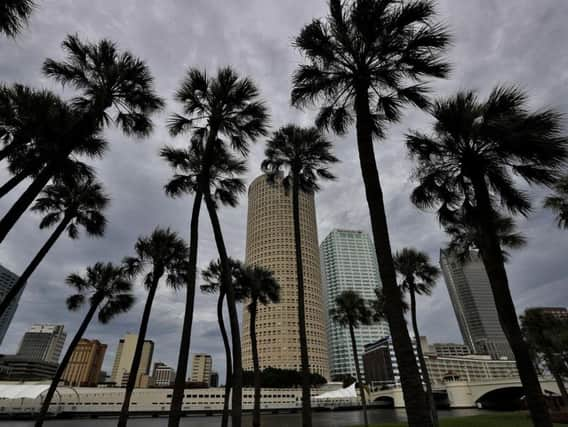Britons warned as tornadoes herald Hurricane Irma's arrival in Florida


Having battered the north coast of Cuba as a category three storm, Irma has regained its category four status as it bears down on the Florida Keys, carrying with it a life-threatening storm surge.
The hurricane began to affect the Sunshine State late on Saturday, its forward reaches sending "embedded tornadoes" sweeping across southern parts.
Advertisement
Hide AdAdvertisement
Hide AdThe eye is now less than 100 miles from the low-lying Keys island chain off the state's south coast, where hurricane-force winds were recorded on Sunday morning.
More than six million people in Florida and Georgia have been urged to leave their homes as the National Hurricane Centre (NHC) warned the storm would bring 110 mph-plus winds, torrential rain and storm surges of up to 15ft.
Florida governor Rick Scott called on anyone still in at-risk areas to follow evacuation orders, saying: "This is clearly a life-threatening situation."
"If you have been ordered to evacuate you need to leave now. This is your last chance to make a good decision," he said on Saturday night.
Advertisement
Hide AdAdvertisement
Hide Ad"Evacuation procedures are in place across the state, more than 6.5 million Floridians have been ordered to evacuate. Do not put yourself or your family's life at risk."
There are fears the low-lying Florida Keys, where near hurricane-force wind gusts were recorded late on Saturday, will suffer catastrophic damage when Irma strikes.
Monitoring the situation from Camp David, President Donald Trump urged people in the danger areas to heed the governor's advice.
"If you're in an evacuation zone you've got to get to a shelter or a place that's higher ground ... there's not many hours left," Mr Scott said.
Advertisement
Hide AdAdvertisement
Hide AdPrime Minister Theresa May said work was taking place with US authorities to ensure British expats and tourists in Florida were protected as millions of locals and visitors flee to safety.
But the Foreign and Commonwealth Office has said its ability to provide assistance to British citizens may be "extremely limited" and advised those affected to make their own contingency plans.
Fears that Miami would take a direct hit from the storm's violent centre were allayed when forecasters altered its expected track to the west. But they warned that the city could still be badly affected.
Meanwhile, some projections have Irma maintaining hurricane strength as she passes the length of Florida and into Georgia.
Advertisement
Hide AdAdvertisement
Hide AdNearly 500 British troops have been sent to Caribbean islands ravaged by Hurricane Irma as Defence Secretary Sir Michael Fallon said the relief operation was "well under way".
Marines, engineers, medics and specialists, including Army and RAF personnel, have been deployed in the region.
The Ministry of Defence said their priority was "establishing security and law and order before providing humanitarian assistance before the arrival of Hurricane Jose".
Irma claimed at least 20 lives, including at least four in the British Virgin Islands and one each on Anguilla and Barbuda, and left thousands of people homeless when it smashed into the region on Wednesday.
Advertisement
Hide AdAdvertisement
Hide AdPowerful Jose began to pull away from the northern Leeward Islands late on Saturday, although a tropical storm watch remained in place for St Martin and St Barts, where Irma wrought destructions days ago.